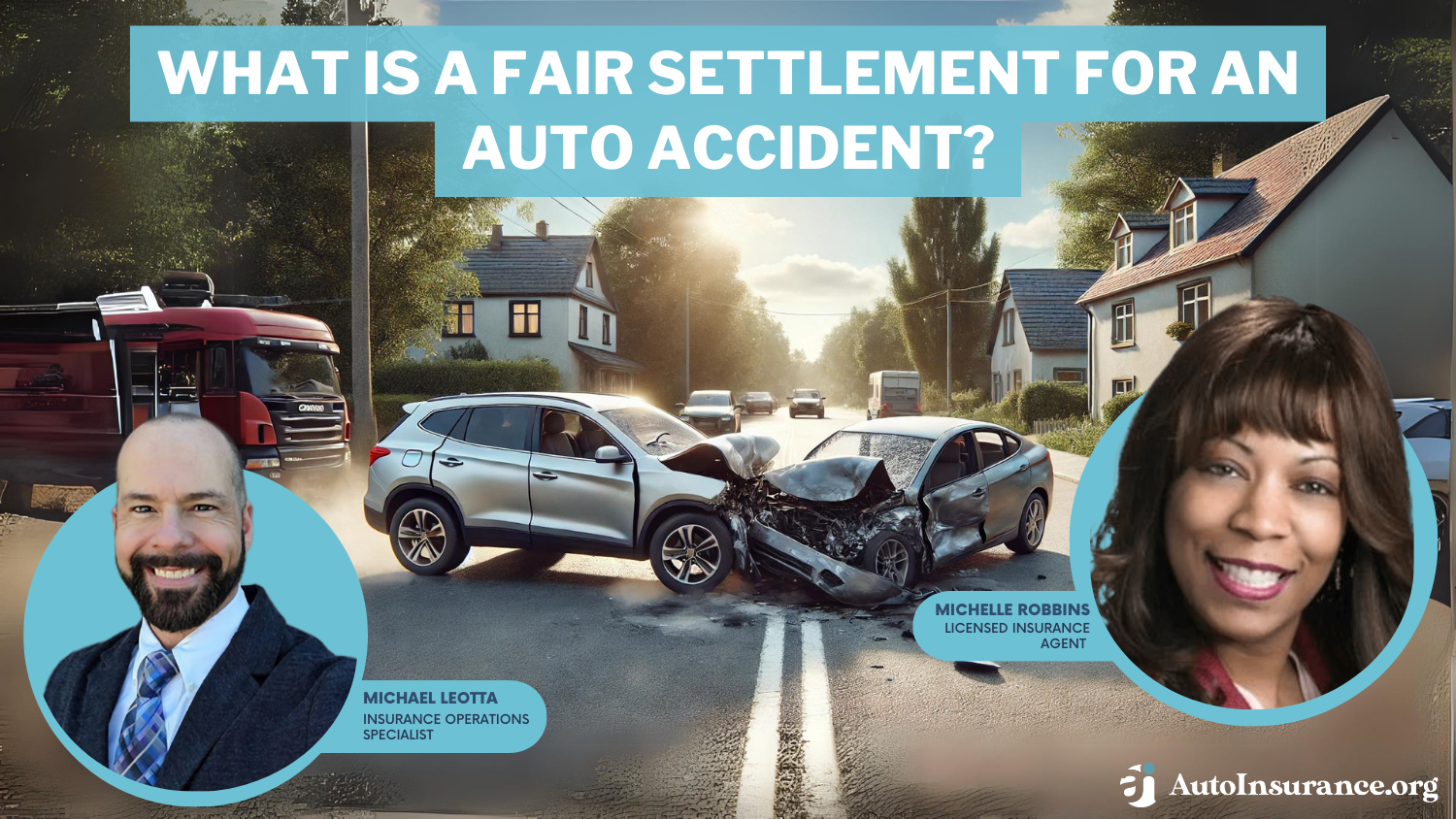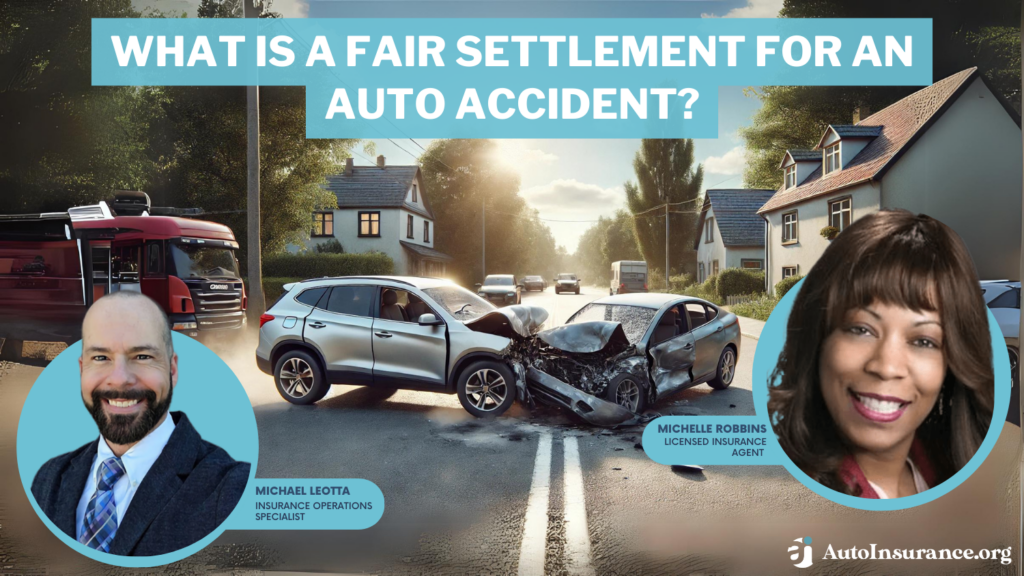People coming out of serious car wrecks rely on insurance proceeds to pay for medical costs, repairs, and living expenses. Here’s our roadmap for getting a fair settlement for your auto accident, including personal injuries, pain and suffering, and damage to your property.
What is a fair insurance settlement from a car accident? Read on to find out more and enter your ZIP code above to compare car insurance rates from the top companies in your area today.
- A fair settlement for an auto accident compensates car accident victims for their personal injuries, property damage, and lost income
- To get a fair settlement, do your own calculation of damages, including 1.5 to 5 times the total damages to compensate for pain and suffering and other noneconomic damages
- When negotiating for more money, starting at the top of your settlement range allows you room to compromise and show good faith
Determining a Fair Insurance Settlement for an Auto Accident Claim
Every car insurance claim is different. A fair settlement depends on your specific damages. When evaluating a settlement offer from an insurance company, it’s important to crunch your own numbers and determine what you think is a fair value to settle your car accident claim.
When making an insurance claim, the first thing is to review the policy to understand your car insurance claims process and know your coverage limits and exclusions.
Figuring out the worth of a car accident claim isn’t hard if you understand the different types of damages.
Types of Damages You Can Get From a Car Accident
There is a broad range of damages in a car accident claim, including:
- Vehicle damage or loss
- Personal property damage or loss
- Medical expenses
- Pain and suffering
- Cost of living with a disability
- Lost wages and income
It helps to break down the types of damages into property-related damages, personal injury-related damages — including pain and suffering — and damages for loss of income related to the accident.
To calculate all of your car accident damages, you’ll need to get your paperwork in order and be ready to present repair bills, medical bills, purchase receipts, and estimates. You also may need documents from your doctors and employer to determine damages relating to future medical care, pain and suffering, and lost wages.
How to Calculate Damages for a Car and Personal Belongings
If your car is damaged, the insurance company will send someone out to inspect your vehicle and put a value on necessary repairs. Keep in mind that you’ll need to get your own estimates if you think the insurance company’s value is low or insufficient.
So, what criteria do insurance companies use to total a car? An insurance company will deem your wrecked car a total loss if the cost of repairs, plus the salvage value for car parts and scrap, is greater than the vehicle’s actual cash value.
If the adjuster considers your car totaled, meaning it’s more expensive to fix the car than what the car is worth, you won’t get the cost of repairs. Instead, the insurer will pay the vehicle’s actual cash value for a totaled automobile. It’s important to understand the difference between a property’s actual cash value versus replacement cost value.
The actual cash value of your car is its current market value minus depreciation because of its age and mileage, minus any diminished value due to prior accidents or excessive wear and tear. On the other hand, the replacement cost value is the amount of money you’d need to buy the same or similar car at today’s cost.
To help figure out your car’s current value, the Insurance Information Institute recommends resources like Kelley Blue Book and the National Automobile Dealers Association’s Guides.
Often personal belongings, like jewelry, laptops, or expensive clothing, are damaged or lost in an automobile wreck. Don’t forget to add these to the value of your claim. Provide the claims adjuster with copies of purchase receipts, homeowner policy schedules, or other proof of the cost to replace the items.
How to Calculate Damages for Medical Costs and Pain and Suffering
Calculating damages relating to physical injuries is more complicated than property damage. In fact, serious or complex personal injury cases may require legal advice.
But the basic thing to remember when figuring out personal injury damages is that they aren’t limited to medical bills, rehabilitation costs, and other recovery expenses. They include noneconomic damages, like compensation for scarring or disability, pain and suffering, long-term medical care, and loss of consortium, which is a spouse’s claim for the loss of companionship, comfort, and care of the injured spouse.
It’s tricky to say how noneconomic damages are measured. Some insurers claim there’s no industry standard, but the typical formula for noneconomic damages is 1.5 to 5 times the total of all quantifiable damages, including medical expenses, repair and replacement costs for damaged or lost property, and projected loss of income.
If you’re wondering if general formulas like Allstate’s pain and suffering calculator adequately compensate accident victims, the answer is not in all cases. So, make sure you bring your special needs and circumstances to the adjuster’s attention so that they are factored into a settlement offer.
How to Calculate Loss of Income Damages
Before an insurance company will compensate you for lost wages, you’ll need to provide a doctor’s note stating your condition or disability, whether you’ll be able to return to work, and when.
Temporary lost wages and income due to car accident injuries are not difficult to calculate. Take your hourly rate and multiply it by the number of missed working hours due to the accident. If you’re salaried, you’ll have to divide your annual salary by 2,080 to get the number of weekday work hours based on a 52-week year.
If you’re self-employed or an independent contractor, your lost income can include work you didn’t get paid for because you were injured, as well as the earnings and profits you would have made if you weren’t injured. Invoices, contracts, proposals, and 1099 forms from prior years are acceptable business records to show lost self-employment income.
If you’re claiming future income losses, lost earning capacity, and lost compensation, you’ll need to hire a personal injury lawyer and a forensic employment expert to establish an opinion as to the value of those damages.
In addition to your payment history, your age, education, employment background, skills, and disability will be factors considered in calculating your future losses.
Free Auto Insurance Comparison
Enter your ZIP code below to view companies that have cheap auto insurance rates.
Secured with SHA-256 Encryption
How the Auto Insurance Claim Process Works
You may not know how to file a car insurance claim, but it’s a fairly simple and straightforward process. Here are the steps most claims processes follow.
Step 1: Report the Accident in a Timely Manner
Most car insurance policies require you to report all accidents, even minor ones. Be aware that you may lose your right to coverage if you wait too long to notify your provider of an accident, especially if there were injuries and property damage.
Step 2: File a Formal Claim
If you caused the accident, you must file your claim under your policy. If, however, you believe the other driver was at fault, your carrier will direct you to file a third-party claim against the other driver’s insurance company.
Step 3: Cooperate and Follow Up With the Adjuster
Make sure you cooperate with the adjuster’s requests. Be ready to provide copies of bills, estimates, and other documents they will need to process your claim. If you suffered injuries, you’ll likely be required to sign a release for your medical records.
Step 4: Wait for the Claim Determination
The amount of time it takes to process an auto accident claim varies from adjuster to adjuster, depending on their caseload or the amount of time it takes to investigate a claim, so be patient.
Uh oh! Caught in an auto accident?😱Don't get run over by the claims process! Learn how to file your claim and get back on the road quickly at https://t.co/27f1xf131D.🚗Find out more information here 👉: https://t.co/Ndz4m4BRIF pic.twitter.com/5cwtCeuTi7
— AutoInsurance.org (@AutoInsurance) April 10, 2023
If the insurance company determines that your claim is covered and approves your claim, then you can begin settlement negotiations as to the value of your claim.
Conversely, if your claim is denied, you’ll have to go through the appeals process to have that determination overturned. If an insurance company denies your car accident claim, you may want to consult with an attorney.
Step 5: Negotiate a Fair Settlement
Some pointers on how to respond to a settlement offer include:
- Don’t Take the First Offer. Remember the adjuster has a range of settlement authority, so as tempting as it is, it may not be advisable to take their first offer, which will be at the lowest end of their range.
- Don’t Leave Out Special Circumstances. Key points to emphasize should include pain and suffering and long-term impacts. Make sure you have medical and employment documents backing up your special circumstances.
- Don’t Be Afraid to Ask for More Money. Never start with the minimum dollar amount you’re willing to take. Starting with your top number allows you room to compromise and show good faith in dealing with the adjuster. If you start with the bottom floor of your range, unfortunately, negotiations can only go down from there.
Remember, you can hire an attorney to assist you with negotiations if needed.
The Bottom Line: You Can Negotiate a Fair Car Accident Settlement
It’s a relief that your car accident claim was approved, but don’t jump at the first settlement offer. Remember, the insurance adjuster has a payout range and will always start at the lowest amount.
A fair settlement offer should compensate you for personal injuries, including pain and suffering, as well as property damage, lost income, and any other special damages that may apply in your case.


